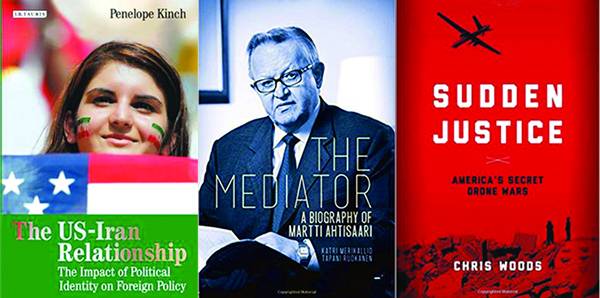
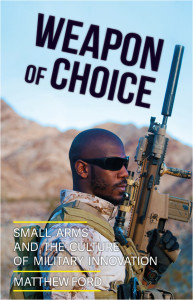
Weapon of Choice. Small Arms and the Culture of Military Innovation
Matthew Ford
Hurst & Co (2017)
Rs4,680
This book examines Western military technological innovation through the lens of developments in small arms during the twentieth century. These weapons have existed for centuries, appear to have matured only incrementally and might seem unlikely technologies for investigating the trajectory of military–technical change. Their relative simplicity, however, makes it easy to use them to map patterns of innovation within the military–industrial complex. Advanced technologies may have captured the military imagination, offering the possibility of clean and decisive outcomes, but it is the low technologies of the infantryman that can help us develop an appreciation for the dynamics of military–technical change.
Tracing the path of innovation from battlefield to back office, and from industry to alliance partner, Ford develops insights into the way that small arms are socially constructed. He thereby exposes the mechanics of power across the military–industrial complex. This in turn reveals that shifting power relations between soldiers and scientists, bureaucrats and engineers, have allowed the private sector to exploit infantry status anxiety and shape soldier weapon preferences. Ford’s analysis allows us to draw wider conclusions about how military innovation works and what social factors frame Western military purchasing policy, from small arms to more sophisticated and expensive weapons.
Matthew Ford is a lecturer in International Relations at the University of Sussex. He has a PhD in War Studies from King’s College London and is an Honorary Historical Consultant to the Royal Armouries, a former West Point fellow and a founding editor of the British Journal for Military History.
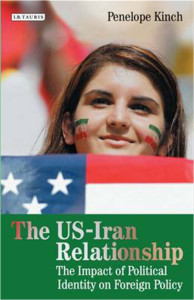
The US-Iran Relationship: The Impact of Political Identity on Foreign Policy
Penelope Kinch
I.B.Tauris & Co Ltd. (2016)
Rs10,766
Since the Revolution of 1978/79, which eventually brought to power Ayatollah Khomeini and his circle of conservative, though politically active, clerics, the relationship between Iran and the USA has represented one of the world’s most complex and hostile international entanglements. In this book, Penelope Kinch analyses the extent to which political identity has contributed to challenges in the relationship and the role of myths in foreign policy. Kinch first examines the construction of political identity in each country, and thereby traces the imagined norms which have their impact on international behaviour. Looking at the misperceptions that have precluded closer communication between the two states, Kinch examines both historical issues, such as the 1979 US embassy hostage crisis as well as more contemporary crises, most notably over Iran’s nuclear power programme.
Penelope Kinch holds a PhD in International Relations from the Centre for Arab and Islamic Studies at the Australian National University. She is currently working as a risk management advisor for an international NGO.
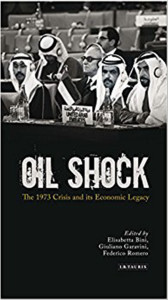
Oil Shock: The 1973 Crisis and Its Economic Legacy
Elisabetta Bini
I.B. Tauris & Co Ltd (2016)
Rs10,766
The ‘Oil Shock’ of 1973 the shift from the era of low-priced oil to the era of high-priced oil?was a turning point in the history of the 20th century. This book provides an analysis of the crisis and its global political and economic impact. It features contributions from a range of perspectives and approaches, including political, economic, environmental, international and social history. The authors examine the origins of the ‘oil revolution’ for oil-producing countries, as well as the far-reaching effects on oil and international energy markets, international relations and the global economy; and the long term effects on the Cold War, Soviet energy policies and decolonization. In doing so, they provide a detailed picture of one of a defining event of the last century, an event that set the framework for the changes that have led to the quite different energy scenario of today.
Elisabetta Bini is Research Fellow at the University of Rome. She was a Max Weber Postdoctoral Fellow at the European University Institute in Florence and holds a PhD in Modern History from New York University.
Giuliano Garavini is Research Fellow at the University of Padua and Senior Fellow at New York University Abu Dhabi. He is the author of After Empires: European Integration, Decolonization and the Challenge from the Global South, 1957-1986.
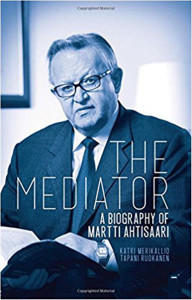
The Mediator: A Biography of Martti Ahtisaari
Katri Merikallio
Hurst; Tra edition (2015)
Rs3,900
Martti Ahtisaari is the world’s most renowned and successful mediator in international conflicts. In 2008 he was awarded the Nobel Peace Prize for his lead role in bringing independence to Namibia, Serbia’s withdrawal from Kosovo, the decommissioning of weapons in Northern Ireland and autonomy for Aceh in Indonesia. Ahtisaari’s range of international contacts and global experience are remarkable and his is the name which is still most often mentioned when the world looks for an individual to try to broker a peace deal.
Ahtisaari also served for six years as President of Finland, the first holder of that office to be directly elected. Upon leaving office, he founded Crisis Management Initiative, an international NGO specialising in conflict resolution and development issues. The Mediator is an authorized biography, based on extensive interviews with Ahtisaari himself as well as his family, friends and colleagues.
Katri Merikallio and Tapani Ruokanen are both Senior Editors of the leading Finnish periodical, Suomen Kuvalehti.
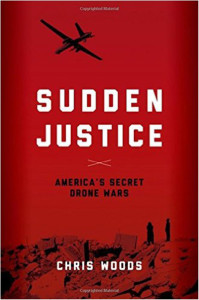
Sudden Justice: America’s Secret Drone Wars
Chris Woods
Hurst & Co (2015)
Rs3,120
Less than a month after the September 11th attacks, a tiny, CIA-controlled Predator drone flew over Kandahar, searching out the home of the Taliban supreme commander Mullah Mohammed Omar. A lack of understanding of the drone’s capabilities combined with a messy chain of command allowed Omar to escape, but the strike on a nearby convoy vehicle became the Predator’s first lethal action. Since then, the use of armed drones has become the dominant American way of war.
In Sudden Justice, award-winning investigative journalist Chris Woods explores the secretive history of the United States’ use of armed drones and their key role not only on today’s battlefields, but also in a covert targeted killing project that has led to the deaths of thousands. The CIA nurtured and developed drones before the War on Terror ever began, seeking a platform from which it could monitor its targets and act lethally and instantly on the intelligence it gathered. Since then, remotely piloted aircraft have played a critical role in America’s global counter-terrorism operations and have been deployed to devastating effect in conventional wars in Afghanistan, Iraq, and Libya. Drone crews, analysts, intelligence officials and military commanders all speak frankly to the author about how armed drones revolutionized warfare—and the unexpected costs to some of those involved.
But there is another, secret war—one in which drones scour the skies of Yemen, Pakistan, and Somalia in search of militant and terrorist targets. The American government insists that this hidden war is legal. The CIA even claims that its armed drones are “the most precise weapon ever invented,” so perfect that civilians are no longer killed. Sudden Justice describes the reality of this secret drone war, one in which hundreds of civilians have died, and the wider strategic interests of the United States may have been jeopardized.
The ability to target its enemies from the safety of headquarters thousands of miles from the battlefield has profound implications for how America conducts its foreign policy, and for how it is seen in the world. As the first book to comprehensively assemble and analyze the facts about the U.S. drone program, Sudden Justice is the essential guide for understanding its implications.
Chris Woods is an investigative journalist who specializes in conflict and national security issues. A former senior BBC Panorama producer, he has authored several investigations into covert U.S. drone strikes and their true effects. He was awarded the Martha Gellhorn Journalism Prize for his work, and lives in London.

